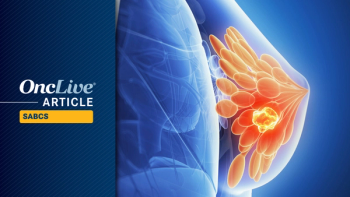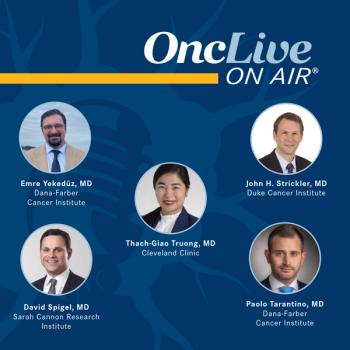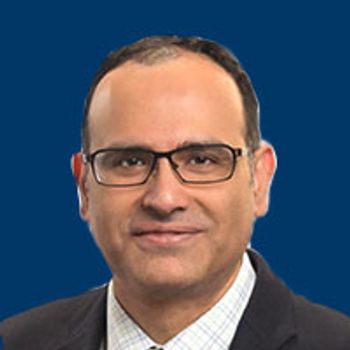
Drs Rhodes and Patel highlight how the chronic lymphocytic leukemia treatment paradigm continues to evolve with advances in targeted therapy.

Your AI-Trained Oncology Knowledge Connection!


Drs Rhodes and Patel highlight how the chronic lymphocytic leukemia treatment paradigm continues to evolve with advances in targeted therapy.

Breast oncology experts discuss SABCS 2025 data from HER2CLIMB-05 and lidERA that may influence maintenance therapy and adjuvant endocrine care.

Tucatinib plus HP improved median investigator-assessed PFS by 8.6 months as first-line maintenance vs HP alone in HER2-positive metastatic breast cancer.

Drs Lee and Joseph discuss the significance of the FDA approval of linvoseltamab for the treatment of patients with relapsed/refractory multiple myeloma.

Erika Hamilton, MD, discusses data for vepdegestrant vs fulvestrant in ER-positive, HER2-negative advanced breast cancer.

David Spigel, MD, discusses evaluating the utility of adjuvant chemotherapy in patients with stage IA to IIA NSCLC identified as high risk by a 14-gene molecular assay.

Zanidatamab/chemotherapy showed early antitumor activity with a manageable safety profile in patients with HER2-expressing metastatic breast cancer.

Erika P. Hamilton, MD, discusses the current role of CDK4/6 inhibitors and evolving targeted therapies in advanced HR-positive, HER2-negative breast cancer.

Erika P. Hamilton, MD, discusses how mutational profiles inform the management of HR-positive breast cancer after progression on a prior CDK4/6 inhibitor.

Melissa L. Johnson, MD, discusses the evolution of immunotherapy approaches beyond PD-1 inhibition in lung cancer.

Benjamin Garmezy, MD, discusses the rationale for developing zelenectide pevedotin in metastatic urothelial carcinoma.

Minoo Battiwalla, MD, MS, discusses both the benefits and the limitations of treatment with CAR T-cell therapy across hematologic malignancies.

Minoo Battiwalla, MD, MS, discusses the potential of FLT3-ITD and menin inhibitors to broaden the acute myeloid leukemia treatment paradigm.

Minoo Battiwalla, MD, MS, discusses the variety of bispecific antibodies evaluated for patients with NHL, including DLBCL.

Meredith McKean, MD, discusses the efficacy of fianlimab given in combination with cemiplimab for patients with advanced melanoma.

Treatment with belrestotug plus dostarlimab yielded a clinically meaningful improvement in ORR vs dostarlimab monotherapy in unresectable PD-L1–high NSCLC.

Experts from across oncology specialties discuss the abstracts and presentations they are most looking forward to seeing at the 2024 ESMO Congress.

Erika P. Hamilton, MD, discusses the safety profile of ADCs in patients with hormone receptor–positive, HER2-low and -ultralow breast cancer.

Minoo Battiwalla, MD, discusses remaining unmet needs for patients with multiple myeloma and potential strategies being explored to address these needs.

Adam M. Brufsky, MD, PhD, and Erika P. Hamilton, MD, share their perspectives on the future landscape of HR+/HER2- locally advanced or metastatic breast cancer treatment and provide essential insights to summarize the key points of their discussion.

Medical experts address the challenges of managing adverse events in the treatment of HR+/HER2- locally advanced or metastatic breast cancer.

Recent studies of novel mTOR inhibitors in combination with various agents have shown how these combinations may be used for patients with solid tumors.

Key opinion leaders discuss other clinical trials, including the EMERALD study, and targeted therapies for the treatment of HR+/HER2- locally advanced or metastatic breast cancer in later lines of therapy.

Erika P. Hamilton, MD, discusses the CAPItello-291 trial, which investigated the combination of capivasertib and fulvestrant in advanced HR+, HER2- locally advanced or metastatic breast cancer and led to its FDA approval, emphasizing the improved progression-free survival observed in patients with PIK3CA, AKT1, and PTEN alterations.

The panel examines how resistance mutations influence the efficacy of subsequent treatment lines and delves into the process of selecting later-line therapies based on next-generation sequencing results.

Key opinion leaders explore the mechanisms of resistance that can develop after endocrine therapy and CDK4/6 inhibitor treatment in HR+/HER2- locally advanced or metastatic breast cancer, emphasizing the uncertain etiology of resistance and current hypotheses, while also examining biomarkers that may predict resistance to CDK4/6 inhibitors and endocrine therapy.

Vivek Subbiah, MD, details the rationale for combining sapanisertib with ziv-aflibercept or metformin and next steps for mTOR inhibitors in solid tumors.

Adam M. Brufsky, MD, PhD, and Erika P. Hamilton, MD, delve into the most clinically significant genomic tests and biomarker assays employed in HR+/HER2- breast cancer, focusing on BRCA mutations, PIK3CA alterations, AKT1 alterations, and PTEN alterations, which play crucial roles in determining prognosis and guiding treatment decisions.

Medical experts share their strategies for choosing initial treatment options for HR+/HER2- locally advanced or metastatic breast cancer, debating the most effective frontline therapies based on clinical trial evidence, while also discussing their aspirations for a new standard of care, and the challenges of managing disease progression.

Minoo Battiwalla, MD, discusses the role of bispecific antibodies as an alternative to CAR T-cell therapies in NHL, treatment strategies for aggressive follicular lymphomas, and more.